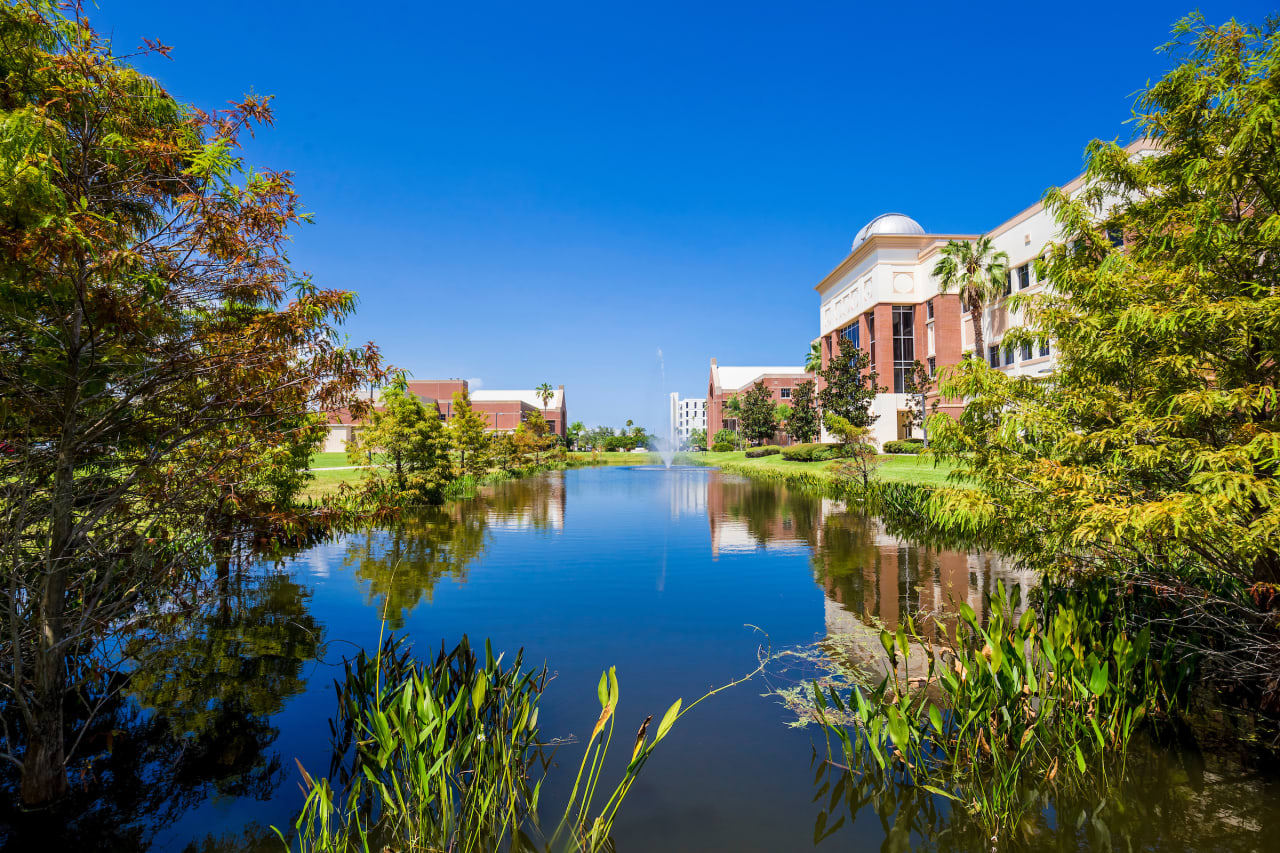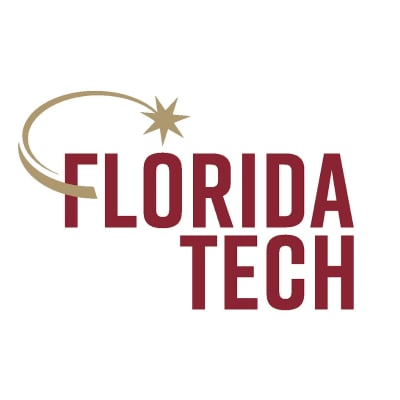
BS in Aerospace Engineering
Florida Institute of Technology

Key Information
Campus location
Melbourne, USA
Languages
English
Study format
On-Campus
Duration
4 years
Pace
Full time
Tuition fees
USD 21,173 / per semester
Application deadline
Request info
Earliest start date
Sep 2024
Introduction
What is an Aerospace Engineering Degree?
Aerospace engineering is primarily concerned with the design and analysis of aircraft and spacecraft. Subfields include aerodynamics, structures, controls, and propulsion systems. Students who choose to earn an aerospace engineering degree at Florida Tech are part of a prestigious program that consistently receives accolades, at a university that is ranked in the nation’s top tier.
Whether you want to design aircraft, develop new methods of propulsion, or be part of a team for space exploration, an aerospace engineering degree from Florida Tech is the one you want. Here you'll develop a strong background in engineering and get hands-on experience in fields like aerodynamics and fluid mechanics.
Earn an Advanced Degree
After receiving their aerospace engineering degree, many of our students go on to receive graduate degrees at Florida Tech, or at other prestigious universities including Stanford, Johns Hopkins, Virginia Tech, and MIT.
Why Pursue an Aerospace Engineering Degree at Florida Tech?
The aerospace engineering program at Florida Tech is a challenging course of study that offers students a chance to tackle compelling and relevant engineering problems using cutting-edge engineering tools and laboratory equipment.
Accreditation
The undergraduate aerospace engineering program is accredited by the Engineering Accreditation Commission of ABET.
Small Class Sizes and Low Student-to-Faculty Ratio
The academic environment in the College of Engineering is particularly conducive to personalized one-on-one attention from professors. With its small class sizes (usually fewer than 25 students per class), Florida Tech boasts a low student-to-faculty ratio while providing a high-quality curriculum. Working alongside professors in internships and research also gives students a more robust learning experience.
Work with Internationally Recognized Faculty
Our professors share a special dedication to teaching and working with students; they have many years of relevant background in aerospace systems and are leaders in innovative aerospace research. Two of our professors are Boeing Welliver Faculty Fellows, and three are American Institute of Aeronautics and Astronautics (AIAA) Associate Fellows. In addition, one of our professors recently received the coveted AIAA Faculty Advisor of the Year award.
Great Florida Location in the Heart of the World’s Gateway to Space Exploration
Florida Tech is truly the ideal aerospace engineering university because of its position on the Space Coast (so named because of the presence of NASA and the Kennedy Space Center on Cape Canaveral just north of us). In addition to the many academic benefits our students gain at Florida Tech, the university also has connections to world-leading aerospace companies such as Northrop Grumman, Lockheed Martin, SpaceX, and Harris Corporation. These relationships enable our students to form valuable connections that lead to future career opportunities.
The area has the fifth-largest high-tech workforce in the country, with more than 5,000 high-tech corporations and government and military organizations located nearby. This workforce also provides a variety of internship and employment opportunities.
Florida Tech is just minutes from 72 miles of beautiful beaches, and a short trip to the Florida Keys or the Orlando theme parks. We also have a rich campus life that includes intramural and collegiate sports, clubs, and social activities.
Build Lasting Professional Relationships through Campus Organizations
Beyond the classroom, aerospace engineering majors build leadership and professional experience through exciting internships (see below) and participation in campus academic organizations like Sigma Gamma Tau (the aerospace engineering honor society), the American Institute of Aeronautics and Astronautics, the Student Rocket Society, student government, and over 100 other campus-wide student organizations.
In addition, Florida Tech’s student branch of the American Institute of Aeronautics and Astronautics promotes the collection of aerospace research, talks, tools, and activities, and plans a variety of events to share its interests.
Curriculum
Gain Practical Experience
Florida Tech’s BS in Aerospace Engineering begins with courses that give you an excellent grounding in both engineering and calculus-based physics. In addition, students are introduced to aircraft design in their first year, in contrast to other schools that reserve it as a junior- or senior-year experience. You can expect to learn basic machining; use software to build models and analyze real aerospace parts and systems; and design, build, and test your own model airplane or rocket.
As a senior, you will complete a senior design project in collaboration with a team of your peers. Together, you will conceptualize, design, construct and present an aerospace system or component that fulfills a real-world need, then present the project to industry leaders and potential employers.
New technical electives allow you to specialize in unique career-track subfields such as systems engineering, nanotechnology, sustainability, flight test engineering, and control of space systems, making you an extremely valuable prospect in the eyes of future employers.
Degree Requirements
Candidates for a Bachelor of Science in Aerospace Engineering must complete the minimum course requirements outlined in the following curriculum.
Curriculum
The field of aerospace engineering has grown rapidly in recent decades to assume a vital role in modern human endeavors. Ranging from manned lunar excursions, exploration of the solar system and ecological study of Earth, to beneficial commerce on space stations and high-quality products for humans and military concerns, the contributions from the aerospace engineering profession have been profound. Aerospace engineers are currently involved in space station operations and are expected to take part in future moon base and space station missions, as well as manned exploration of Mars. The many spin-offs from their involvement in these activities in space will surely benefit humanity just as has their previous space involvement.
The undergraduate curriculum for the aerospace engineering major at Florida Tech presents the fundamentals underlying modern aerospace engineering and prepares the student for a lifetime of continued learning. During the freshman and sophomore years, emphasis is placed on mathematics and physics, while aerospace engineering is introduced through a sequence of three courses. The sophomore and junior years direct the student toward the engineering sciences, including materials science, thermodynamics, and fluid mechanics. During the junior and senior years, the study becomes progressively centered on the specific issues facing practicing aerospace engineers.
The aerospace engineering major uses the basic tools imparted during the first two years and applies them in studies of aerodynamics, propulsion systems, aerospace structures, and design projects. Other courses taken during the last two years expand the student’s knowledge in the fields of mechanics of solids, electric circuits, flight stability and control, and mission analysis. Technical electives taken during the junior and senior years allow the student to direct the program toward specific areas of personal interest, such as flight training and human factors engineering, space science, mathematics, computer science, or other engineering disciplines.
Laboratory experiences are essential to the education of engineers, and these are provided in chemistry, physics, computers, materials, fluids, structures, and experimental aerodynamics. The capstone of the educational process is embodied in the aerospace engineering design project, which synthesizes and focuses elements from the various disciplines into a design activity of current aerospace engineering interest. The faculty of the program serve jointly in the supervision and consultation of these projects.
Aerospace engineering majors are encouraged to define career objectives early in the program (preferably during the sophomore year), so that in consultation with faculty advisors, electives can be selected that are best suited to the achievement of specific goals.
Aerospace engineering majors may also choose to benefit from the experience gained through the cooperative education program. After graduation, the aerospace engineering student is prepared to pursue a career in either industry or government as a practicing engineer or to enter graduate study in engineering, applied mechanics, or mathematics.
Program Outcome
Educational Objectives
The broad educational objectives of the aerospace engineering program at Florida Tech are:
- Academic fundamentals: Graduates have successfully applied and integrated their knowledge of fundamental principles in their chosen careers.
- Engineering practice: Graduates have used their engineering skills in the successful completion of an engineering project.
- Teamwork and communication: Graduates have demonstrated the ability to communicate their ideas and technical results verbally, in writing, and via presentations, and are effective team members.
- Professional development: Graduates have advanced their knowledge and contributed to the profession and society.
Career Opportunities
Career Outlook
Graduates with an aerospace engineering degree from Florida Tech are eagerly recruited by employers, including:
- NASA
- US Department of Defense
- Boeing
- Lockheed Martin
- Northrop Grumman
- GE
- Pratt and Whitney
- Revolutionary Research
- SpaceX
- Harris Corporation
- Federal Department of Transportation
- Department of Homeland Security
- Federal defense contractors
Jobs that provide an aerospace engineering career are often related to national defense and demand a security clearance. These types of restrictions keep jobs in the United States. As policies on noise pollution and better fuel efficiency continue to increase, there will be a rising demand for aerospace engineers. In addition, as governments refocus their space efforts, new private companies outside of standard space agencies are emerging to explore access to space. These efforts will expand opportunities for anyone seeking an aerospace engineering career.
Facilities
English Language Requirements
Certify your English proficiency with the Duolingo English Test! The DET is a convenient, fast, and affordable online English test accepted by over 4,000 universities (like this one) around the world.